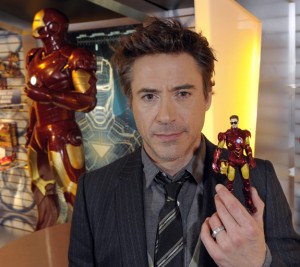Marvel Studios has struck a deal with a company out of China called DMG to help finance the upcoming Iron Man 3. I know that our Honcho was having a wise-ass laugh with his two-word story earlier today – but to me, this development is newsworthy for a number of reasons.

"They made these in China, so why the hell not?"
It speaks to the sort of strategies Marvel is prepared to utilize to stretch a budget. The Iron Man 3 production is rumored to cost $200 million – and while we don’t know how much cake DMG will kick in (or how much of what they kick in will be provided via government subsidies) – we now know that, because of the deal, a portion of the film will actually be shot in China (whose capital city’s futuristic skyline was one of the most compelling elements of Kurt Wimmer’s largely-forgotten Ultraviolet).
It speaks to the all-encompassing need to make films for the global market – specifically the previously-untapped Motherland.
When a film like John Carter doesn’t connect with audiences stateside, decent worldwide grosses obviously soften the blow. In the case of Carter, the film’s disappointing $70 million domestic haul is bolstered by a $200 million showing in the rest of the world – which isn’t abysmal. Better than $30 million of those grosses (thus far) are from China, where the film sits behind the last Pirates of the Caribbean film on the list of the mainland’ s highest openings. It means a lot to makes sure your film can play the territory.
The problem with distro in La Chine is that the government has very specific objections to content – and those objections oftentimes become insurmountable. For the recent re-release of Jim Cameron’s Titanic, Kate Winslet’s demure nude scene had to be excised, meaning that the Chinese were denied the only reason to bother seeing the film in 3D.
So the government has no problem tinkering with a film they had nothing to do with, obviously – how might they treat a film they actually have a financial stake in? Perhaps Brick/Brothers Bloom/Looper filmmaker Rian Johnson has some insight, as his new film was co-financed by DMG. One wonders if the Chinese element in that film was always there, or if it was something added to appeal to/appease these production partners? I asked the genius filmmaker behind one of my absolute favorite films how it was working with DMG. His response (via Twitter):
“They’re awesome.”
And yeah – it’s entirely possible that this is much ado – after all, one need only look to Hong Kong to see an example of the Chinese government’s fiscally liberal “if-it-ain’t-broke-don’t-fix-it” take on the former British protectorate. The island’s making money – why try to change the political face of it and upset the apple cart? China is seen by most as a far more progressive nation than it was only a decade ago – but it’s still not a free-speaking, free-thinking utopia. Homegrown productions are constantly scrutinized by government-sanctioned censors for their messages/subtext – and in his position as mouthpiece for the Chinese film industry, (through DMG partner China Film Group, a production organization funded in part by the Chinese government) Jackie Chan has made waves with statements of support for the Chinese government (which oftentimes run counter to the subtext on display in some of his earlier films – most notably Police Story III aka Supercop). China Film Group itself is well-known for producing outright propaganda like The Founding of a Republic (starring Vicki Wei Zhao, Donnie Yen, Stephen Chow, Jackie Chan, Neon Leon Lai, Tony Leung, Andy Lau, Jet Li, Ziyi Zhang and every other superstar in Asia not named Chow Yun-Fat) and The Founding of a Party (with Chow Yun-Fat).
But perhaps because their participation in the Marvel production is a moneymaking endeavor (DMG retains distribution rights for the film in China) – and meant to entice business from around the world – they might be inclined to let foreign filmmakers have a greater degree of control over the finished project?
Not so fast – at least not where Ol’ Shellhead is concerned.
With regard to Iron Man 3, the DMG deal becomes the determining factor behind The Mandarin NOT being the villain. Under no circumstances would the Chinese allow a Western production to employ a Chinese character as a sinister terrorist – no matter how well-written or compelling or not a racist cartoon he may be once he’s revised for filmic consumption. Is this an instance where the filmmakers will be limited before one frame of film is shot? Is this a situation wherein different parts of the globe will see differing cuts of Shane Black’s opus?
As director Russell Mulcahy once said in his stirring cameo in Highlander II…the world is watching. The outcome could start an influx of American productions to China – or end the beautiful dream before it begins.